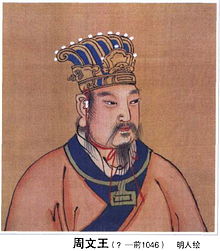King Wen of Zhou
| Ji Chang | |||||||||
|---|---|---|---|---|---|---|---|---|---|
 |
|||||||||
| King of Zhou | |||||||||
| Reign | 1099–1050 BC (49 years) | ||||||||
| Born | 1152 BC | ||||||||
| Died | 1056 BC (aged 96) | ||||||||
| Spouse | Tai Si | ||||||||
| Issue |
Boyi Kao Fa, King Wu of Zhou Xian, Marquess of Guan Dan, Duke of Zhou Du, Marquess of Chai Wu, Earl of Cheng Chu, Marquess of Huo Feng, Marquess of Wei Zheng, Earl of Mao Ranjizai, Lord of Dan Lord of Gao Viscount of Yong Zhenduo, Earl of Cao Xiu, Viscount of Teng Gao, Earl of Bi Earl of Yuan Marquess of Feng Marquess of Xun Grandson Cen Zi (Qu), Viscount of Cen |
||||||||
|
|||||||||
| Father | King Ji of Zhou | ||||||||
| Mother | |||||||||
| Posthumous name | |
|---|---|
|
King Wen (文王) Emperor Wen (文皇帝) |
|
| Temple name | |
| Shizu (始祖, lit. "First Founder") |
| King Wen of Zhou | |||||||||||||||||||||||||||
| Chinese | 周文王 | ||||||||||||||||||||||||||
|---|---|---|---|---|---|---|---|---|---|---|---|---|---|---|---|---|---|---|---|---|---|---|---|---|---|---|---|
| Literal meaning | "The Cultured King of Zhou" | ||||||||||||||||||||||||||
|
|||||||||||||||||||||||||||
| Alternative Chinese name | |||||||||||||||||||||||||||
| Chinese | 姬昌 | ||||||||||||||||||||||||||
| Literal meaning | (personal name) | ||||||||||||||||||||||||||
|
|||||||||||||||||||||||||||
| Transcriptions | |
|---|---|
| Standard Mandarin | |
| Hanyu Pinyin | Zhōu Wén wáng |
| Gwoyeu Romatzyh | Jou Wen wang |
| Wade–Giles | Chou1 Wen2 wang2 |
| IPA | [ʈʂóu wə̌n wǎŋ] |
| Yue: Cantonese | |
| Yale Romanization | Jāu Màhn wòhng |
| Jyutping | Zau1 Mun4 wong4 |
| Southern Min | |
| Hokkien POJ | Chiu Bûn Ông |
| Old Chinese | |
| Baxter-Sagart | *Tiw Mə[n] ɢʷang |
| Transcriptions | |
|---|---|
| Standard Mandarin | |
| Hanyu Pinyin | Jī Chāng |
| Gwoyeu Romatzyh | Ji Chang |
| Wade–Giles | Chi1 Ch'ang1 |
| IPA | [tɕí ʈʂʰáŋ] |
| Old Chinese | |
| Baxter-Sagart | *[k](r)ə mə-tʰaŋ |
King Wen of Zhou (Chinese: 周文王; pinyin: Zhōu Wén Wáng; 1152 – 1056 BC) was king of Zhou during the late Shang dynasty in ancient China. Although it was his son Wu who conquered the Shang following the Battle of Muye, King Wen was honored as the founder of the Zhou dynasty. A large number of the hymns of the Classic of Poetry are praises to the legacy of King Wen. Some consider him the first epic hero of Chinese history.
Born Ji Chang (姬昌), Wen was the son of Tai Ren and Ji Jili, the king of a small state along the Wei River in present-day Shaanxi. His father was betrayed and executed by the Shang king Wen Ding in the late 12th century BC.
He married Tai Si and had at least ten sons.
At one point, King Zhou of Shang, fearing Wen's growing power, imprisoned him in Youli (present-day Tangyin in Henan). However, many officials respected Wen for his honorable governance and they gave King Zhou so many gifts – including gold, horses, and women – that he released Wen, who subsequently planned to overthrow King Zhou but died before he could accomplish it. His second son, King Wu, followed his father's wishes and crushed the Shang at Muye, creating the imperial Zhou dynasty.
...
Wikipedia
